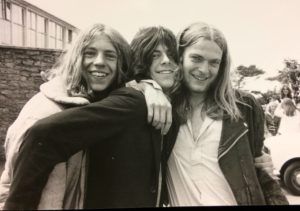Call it the paradox of meritocracy. When talent is given space to flower, if barriers to success are pushed aside, what happens if success does not come? When society lifts external weights from the shoulders of the downtrodden, a new set of weights inevitably settles in people’s hearts and minds. That deadweight belief, however unrealistic: this is down to me. I failed not because of the system, the man, the establishment, but because of my inadequacy.
No wonder people turn to conspiracies or theories of identity oppression.
It would be a strange person who would actively campaign for a return to the social attitudes of the Seventies. But writing my book about growing up in that uniquely screwed up decade, I was reminded that class has its uses — even the weirdest of class systems in which the English, and perhaps only the English, excelled.
In the early Seventies, in an unfashionable, un-Georgian corner of Bath — a place known as Bear Flat — you could spy at lunch time an elderly woman walking slowly towards one of those cafes that used to be part of every city-scape: not a chain; no coffee offered except, well, coffee with milk or without; the food mostly fish and chips or burger and chips or just chips. Ketchup suspiciously decanted (Heinz too pricey) into giant tomato-shaped vessels. There would have been people smoking in a section of it.
The elderly woman, my granny, would sit in a corner and eat some of this basic fare, but call as well for a glass so that she could take her medicine. Poured out from a medicine bottle. Semi-sweet wine, a whole glass full. Granny had no money to speak of and lived in a rented flat, but she had enough to buy wine and drink it every day.
Here is the question that arose: did this daily ritual mean that Granny was working-class? She had never done any work to be sure. Her tiny hands had once played the piano but never lifted anything heavy. She had lived in Italy and studied music in Belgium. Her parents were Irish and Austrian aristocrats who had no job. She had been married to a magazine editor; in the pre-war years they had a cook and a driver.
And yet here she was drinking sweet wine. Which my mother, enter stage right as it were, regarded as working-class. Along with, in no particular order: holding hands, growing begonias, eating in public, saying “toilet”, watching ITV, listening to music while doing something else, saying “couch”, saying “settee”.
Have I missed anything? God yes. It goes on and on. But the wine issue was important. Proper people — by which she meant us, the ruling class — drank dry wine unless it was with pudding.

I asked mum about it once. Her response was bewildering and telling at the same time. Bewildering because it was protected by a carapace of pure, indestructible self-belief. Telling because underneath, it was mush. It was nonsense.
This is the logic: Granny was not working-class because she was not. So when she did working-class things they were not working-class. When working-class people did those things, they were. Got it?
Yep. I grimace too. I cannot defend the attitudes my mother had. She was kindly in many ways. She worked for Amnesty International in the days when it had a single purpose: to help prisoners of conscience. She was a Quaker, a pacifist who visited the protesters at Greenham Common. And yet her view of the human beings she wanted to save from nuclear holocaust, or from foreign jails, was dismissive at best.
Fifty years on, our social attitudes are utterly changed. We have said good riddance to the system that Mum believed in, that kept her and Granny safe from class disaster even when poverty overwhelmed their lives. A system of caste as much as class.
But I wonder at what we have lost: in solidarity, in safety, in togetherness — and above all in psychological freedom. No longer can we shrug and say, whatever, I had no agency. Life is what it is, and I am protected from the deepest psychological hurt because I am a member of a social class and I cannot rise, and cannot fall, because of it.
Consider the falling. Distressed Gentlefolk, like the poor, are always with us. And very sad they often are. Granny certainly was. Even the Association that used to look after them has deserted them, changed its name and cleared its throat, to assure people that its charity is available to all.
But in Britain in the Seventies, Granny and her ilk could hold on to something. They were still able to consider themselves socially superior and, crucially, be treated by everyone else with the kid gloves they could no longer afford to wear. That café had no licence for alcohol consumption, but they let Granny drink her wine because she was a lady. She was treated with deference, although she had nothing.
Granny still fell — economically, materially — but not socially. The pride — the haughty, foolish, risible stuff that she and my mother believed about themselves and their place in society — helped them when times were tough.
And what about those who served them? I think of the man who used to drive me to boarding school. Den Davis (polyester shirt, neat slacks, slicked back hair) ran a one-counter sweet shop squeezed between the railway tracks and the main road. Den was from a part of Bath even more unfashionable than Bear Flat, a section of the city that is still genuinely down at heel. He probably had more ready cash than Mum but treated her with proper reverence, holding open the door of his Vauxhall Viva for her to get in and only closing it once he was sure her coat was safely folded in with her.
Den told me once that the boys at my school (he didn’t acknowledge the education of girls as a serious project) would one day make the world “better for all of us.” He was a victim of class for sure. He had been fooled into believing that this impecunious but grand duo — mother and son — was superior to him.
And yet in the dark of the night, when Den considered his lot, I bet he was able to laugh at us a bit. We had the Queen’s English and the books at home. But he had the car. And the knowledge that he could not compete with us in class matters would have been tempered by the simple fact of being a working man. I don’t think for a minute that he wanted to compete. He had his identity and, crucially, it was an identity that linked him to other people.
This is not, of course, a reason to bring it all back. The kow-towing, the secondary moderns, the manual jobs with no prospects, the judges (and the politicians) who all went to Eton. The staggering waste of talent that was never looked for, never found, never nurtured. But a look back at the Seventies reveals a society in which there were groups, into which all of us could sink our own identities, our own selves.
Meritocracy has flourished thanks to atomisation. And it has come with costs that we are only now daring to start talking about. Class was a warm blanket in that decade of power cuts. When it was pulled away there was always going to be trouble.
Justin’s book, The Gift of a Radio: My childhood and other trainwrecks, is published by Doubleday
Disclaimer
Some of the posts we share are controversial and we do not necessarily agree with them in the whole extend. Sometimes we agree with the content or part of it but we do not agree with the narration or language. Nevertheless we find them somehow interesting, valuable and/or informative or we share them, because we strongly believe in freedom of speech, free press and journalism. We strongly encourage you to have a critical approach to all the content, do your own research and analysis to build your own opinion.
We would be glad to have your feedback.
Source: UnHerd Read the original article here: https://unherd.com





